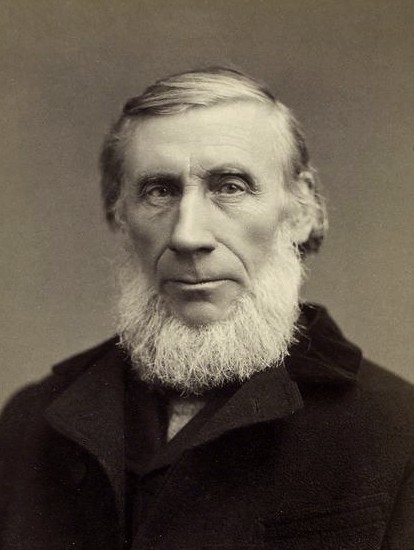
I’m still talking about John Tyndall (right; 1820–1893), the Anglo-Irish physicist remembered for demonstrating the greenhouse effect, and in particular about his 1878 essay “Virchow and Evolution.” Michael D. Barton devoted a 2010 essay in Reports of the NCSE to a case in which Tyndall was misrepresented as admitting that “evolution belongs to the twilight of conjecture”; in fact, what was crepuscular for him was “the theory of evolution applied to the primitive condition of matter” (emphasis added). A different type of misrepresentation, as I explained in part 1, was on display in J. W. Porter’s Evolution—A Menace (1922), which quoted a passage from “Virchow and Evolution” but merged it with two sentences from James Dwight Dana’s Manual of Geology (fourth edition, 1895). And now a final example of yet a different type.
A misleading quotation of Tyndall, involving “Virchow and Evolution,” was provided by a nameless author writing in Popular Science News—or, to give it its apparent full name, The Popular Science News and Boston Journal of Chemistry—in December 1883. A column-length article headed “The Problem of the Universe” begins:
PROFESSOR TYNDALL says, on this subject:—
If asked whether science has solved, or is in our day likely to solve, the problem of the universe, I must shake my head in doubt. Behind, above, and around us, the real mystery of the universe lies unsolved, and, as far as we are concerned, is incapable of solution. The problem of the connection of the body and the soul is as insoluble in its modern form as it was in the pre-scientific ages. There ought to be a clear distinction made between science in the state of hypothesis and in the state of fact, and, inasmuch as it is still in its hypothetical stage, the ban of exclusion ought to fall upon the theory of evolution.
The first, second, and third sentences appear, more or less, in “Virchow and Evolution,” in two adjacent paragraphs, although with the usual crop of sloppy errors. (Interestingly not indicated is the fact that the third sentence is Tyndall quoting himself from 1868.) It is the fourth sentence that is problematic.
In Tyndall’s essay, the fourth sentence occurs in a paragraph two pages later, which begins, “Virchow’s position could not be made clearer by any comments of mine than he has here made it himself,” and continues, as is quite clear, to present Virchow’s views—sometimes in Virchow’s own words (in translation), sometimes in Tyndall’s paraphrase—for the remainder of the paragraph. After quoting a few sentences from Virchow, Tyndall writes, “What, in regard to science, Virchow thinks it [i.e., “the chief substance of the teaching” in Germany’s schools] ought and ought not to be is disclosed by the foregoing quotations. There ought to be a clear distinction made between science in the state of hypothesis and in the state of fact, and, inasmuch as it is still in its hypothetical stage, the ban of exclusion ought to fall upon the theory of evolution.”
It might be objected on behalf of the nameless author that Tyndall adds, in the next paragraph, that he is “for the moment on the side of Virchow”: If Tyndall agrees with Virchow, then is it really so absurd to quote his paraphrase of Virchow as if it expressed his own opinion? But the objection is insupportable. Virchow, according to Tyndall, thinks that evolution ought not to be taught in the schools because it is still hypothetical. Tyndall, for his part, agrees that evolution ought not to be taught in the schools. But he cites a different reason: he thinks that it ought not to be taught “before its meaning has been better understood and its utility more fully recognized than it is now by the great body of the community.” For Virchow, evolution isn’t ready for society; for Tyndall, society isn’t ready for evolution. That’s a significant difference.
I mentioned in part 1 that J. W. Porter’s chimeric passage that combines Dana and Tyndall appears not to have been especially influential. It’s hard to tell whether the Popular Science News passage that misattributes Virchow’s sentiments to Tyndall was influential, however, because it was easy, I suspect, to misread Tyndall in the same way that the nameless author misread him. In Evolution: An Investigation and a Critique (1921), for example, Theodore Graebner quoted the problematic sentence (bifurcating it into two sentences), attributing it to “Professor Tyndall in an article in the ‘Fortnightly Review.’” The citation of the Fortnightly Review is wrong, but the fact that there is no such citation in the Popular Science News article suggests that Graebner was quoting the sentence from elsewhere, and so that the misreading occurred independently.
A possible source for Graebner was a sermon preached by William M. Paxton (1824–1904) at the opening session of the General Assembly of the Presbyterian Church—of which he was the moderator—in Buffalo, New York, on May 19, 1881, and published in The Homilectic Review in the same year. In a footnote, he quotes the problematic sentence from Tyndall. Like Graebner, he bifurcates it, attributes it to The Fortnightly Review, and continues the quotation with “I agree with Virchow that the proofs of it are still wanting, that the failures have been lamentable, that the doctrine is utterly discredited.” That is a mangled version of the sentence quoted by Porter in Evolution—A Menace, but at least Porter realized that Tyndall was agreeing with Virchow about spontaneous generation, not about evolution in general—even if he couldn’t tell Tyndall and Dana apart!

